 |
Robert Axtell *
Homepage
Publications
raxtell@brookings.edu
|
| Robert Axtell is a Fellow in the Brookings Economic Studies Program,
as well as a Visiting Professor at Johns Hopkings University.
He received his Ph.D. in Engineering and Public Policy from Carnegie Mellon University.
His research interests include dynamic models of social and economic systems,
environmental economics and regulation, global change science and policy,
industrial organization and economic geography. |
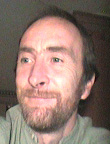 |
Dante Chialvo *
Homepage
|
| Chialvo currently holds positions at Northwestern University, Rockefeller University and the Niels Bohr Institute.
His research interests cover many areas of nonlinear dynamics in physics and biology, including self-organized
models of learning. |
|
 |
Jim Crutchfield *
Homepage
Publications
chaos@santafe.edu |
| Jim Crutchfield is a Research Professor at the Santa Fe Institute,
where he directs the Intel Network Dynamics Program and leads the
Dynamics of Learning Project on the emergence of cooperation in
multiagent systems. He received his Ph.D. in Physics from the
University of California, Santa Cruz, and then moved to UC Berkeley,
where he worked for 14 years before taking his current position.
He is also Scientific Director and co-founder of the Art and Science
Laboratory in Santa Fe, which provides a collaborative environment
in which artists and scientists produce interactive art works. Over
the last two decades he has worked in the areas of nonlinear dynamics,
solid state physics, astrophysics, fluid mechanics, critical phenomena
and phase transitions, chaos, and pattern formation. His current
research interests center on the physics of structural complexity,
statistical inference for nonlinear processes, evolutionary theory,
machine learning, and distributed robotics. |
|
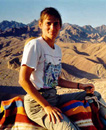 |
Barbara Drossel *
Homepage
Publications
barbara@gina.tau.ac.il
|
|
Barbara is a Heisenberg Fellow at the University of Tel Aviv. She works in the areas
of statistical physics and theoretical biology, and her main interests
are nonequilibrium and disordered systems. In addition to ongoing physical projects,
Barbara is currently working on questions related to the adaptation of bacteria to new challenges.
Her publications and research activities cover the following topics:
- Non-equilibrium thin film growth
- Spin glasses and other random systems
- Winding angles for polymers
- Population dynamics and biological evolution
- Self-organized criticality
|
|
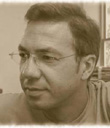 |
Walter Fontana *
Homepage
Publications
walter@santafe.edu
|
Walter is a research professor in residence at the Santa Fe Institute. His research interests include:
- RNA folding and evolutionary dynamics:
Evolution and development at the level of a single molecule
- Abstract Chemistry:
Organization as a self-maintaining network of transformations
- Self-rewiring signaling networks:
Organization as distributed control
|
|
 |
Tad Hogg *
HP Homepage
Personal Homepage
Publications
tad_hogg@hpl.hp.com
|
| Tad is currently at HP Labs. Previously he was in the Internet
Ecologies and Dynamics of Computation groups at Xerox. His graduate work at
Stanford investigated chaos in quantum mechanics and parallel computer systems.
Tad's research interests include:
- multiagent systems
- distributed control of smart matter
- the relation between physics and computation, including
- analogies with physical phase transitions found in combinatorial search problems
- quantum computation
|
|
 |
Neil Johnson *
Homepage
Publications
n.johnson@physics.oxford.ac.uk
|
|
Dr Neil Johnson is a Tutor in Physics at Oxford University. His training in
theoretical physics included taking his BA at Cambridge University (St John's
College) and PhD at Harvard University as a Kennedy Scholar. He was then made
a Research Fellow at St John's College, Cambridge and a Professor in Physics at
the Universidad de Los Andes (Bogota). His research areas include many-body
quantum mechanics, quantum computation, nanostructures and dynamical biological
processes. He also has an interest in the general application of physics to a
wider variety of problems, e.g. traffic flow, financial option pricing theory, and
the minority
game.
|
|
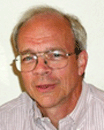 |
Scott Kirkpatrick *
Homepage
Publications & CV (in .pdf)
kirk@cs.huji.ac.il
|
|
Scott is a Professor at the School of Engineering and Computer Science, Hebrew
University, Jerusalem. Previously he spent many years as a manager at IBM's
Computer Science Dept. He did his PhD in physics at Harvard University,
Cambridge, MA.
His research interests include:
- architectures for multimedia computing and communication
- digital TV
- low power technologies, system structures, and software
computer interfaces in the attentive environment { esp. gesture
connections between complexity and statistical physics
understanding communications processes among neurons
- design of information appliances against a moving technology
- connections between complexity and statistical physics
- access to "born digital" material for libraries of the future
|
|
 |
Ilan Kroo *
Homepage
Publications
kroo@leland.stanford.edu
|
|
Ilan Kroo is an Associate Professor of Aeronautics and Astronautics at Stanford
University. He received his B.S. degree in Physics from Stanford in 1978, then
continued studies at Stanford in Aeronautics, leading to a Ph.D. degree in
1983. He worked in the Advanced Aerodynamic Concepts Branch at NASA's Ames
Research Center for four years before returning to Stanford as a member of the
Aero/Astro faculty. Prof. Kroo's research in aerodynamics and aircraft design
includes the study of innovative airplane concepts. He has participated in the
design of human-powered airplanes, flying pterosaur replicas, Americas' Cup
sailboats, and high-speed research aircraft.
|
|
 |
Kristina Lerman *
Personal Homepage
Homepage at ISI
Publications
lerman@isi.edu
|
|
Kristina Lerman is a computer scientist at the Information Sciences Institute,
part of the University of Southern California's School of Engineering. She
received a Ph.D. in physics from University of California at Santa Barbara,
where she studied pattern formation in binary fluid convection. After a two
year interlude in the software industry, she returned to academia as a computer
scientist. However,
once a physicist, always a physicist -- and she is applying her training to
the problems dealt with by her current research.
|
 |
Kai Nagel *
Homepage
Publications
nagel@inf.ethz.ch
|
| Kai is an Assistant Professor of Computer Science
at the Swiss Federal Institute of Technology (ETH) in Switzerland.
He received his Ph.D. in Computer Science from the University of Cologne.
Kai is interested in applying methods from computer science to socio-economic
problems, and to investigate how far these methods go in contributing new
approaches or solutions to such problems. |
|
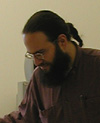 |
Mike New *
Homepage
Publications
mnew@mail.arc.nasa.gov
|
| Michael New received his BS in chemistry from Yale University in 1988.
From the wilds of New Haven he returned home, to New York City, where he
earned a PhD in chemical physics at Columbia University in 1994.
In search of the world's worst pastrami sandwich, he then relocated to the left coast
where he held a post doctoral position in the UC Berkeley chemistry department until June 1995.
After that he took up his present position as a postdoctoral researcher at UC San Francisco.
Michael's research interests focus on the basic biophysical processes of life.
He has studied the hydrophobic effect in model systems(with Bruce Berne),
the primary electron transfer event in the bacterial photosynthetic reaction center
(with David Chandler and Raymond Yee) and is now studying
transmembrane proton transport (with Andrew Pohorille). He is also involved in the development of
methodologies for the application of classical molecular dynamics to chemically reacting systems
and for the study of membranes, monolayers and interfaces under conditions of constant normal
pressure and surface tension. Recently, he has also discovered an interest in the application
of complexity theory and computer science to the origin of life. |
|
 |
Scott Page *
Homepage
Publications
spage@umich.edu
|
|
Scott is an Associate Professor at the Departments of Political Science,
Economics, and Complex Systems at the University of Michigan. He received his
MA in economics at the University of Wisconsin-Madison and PhD at Northwestern
University. His primary focuses are Public Economics, Computational Complexity
and Political Science.
|
|
|
Robert Powers *
powers@cs.stanford.edu
|
|
Robert is a Ph.D. student in Computer Science at Stanford University. He works with
Yoav Shoham.
|
|
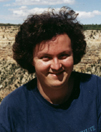 |
Cosma Shalizi *
Homepage
Research & Publications
shalizi@santafe.edu
|
|
Cosma graduated from the University of Wisconsin-Madison in 2001 with
a Ph.D. in physics, on quantitative measures of self-organization.
His research interests include:
- pattern discovery in nonlinear processes
- non-Bayesian inference and machine learning
- intrinsic computation in physical and biological systems
- synchrony in network dynamical systems
- cultural evolution
- institutional economics
- sociology of intellectual communities
|
|
 |
Peter Stone *
Homepage
Publications
pstone@research.att.com
|
|
Peter is currently a Senior Technical Staff Member in the Artificial Intelligence
Principles Research Department at AT&T Labs Research. He graduated in 1998 with a Ph.D.
in Computer Science from Carnegie Mellon University. Peter's Ph.D. thesis was entitled
"Layered Learning in Multi-Agent Systems," and was published as a book by MIT Press.
Current research interests include:
- Artificial Intelligence:
- machine learning
- multiagent systems
- planning
- robotics
|
|
 |
Zoltan Toroczkai *
Homepage
Publications
toro@lanl.gov
|
Zoltan is a fellow at Los Alamos National Laboratory. He obtained his PhD at
Virginia Tech. Zoltan's research interests include:
- Nonlinear Dynamical Systems and Chaos: thermodynamical formalism, chaos
control, transient chaos, chaotic scattering, hydrodynamical chaos
- Nonequilibrium Statistical Mechanics: spin systems, exactly solvable
models, random walks, driven lattice gases
- Fluid Dynamics: chaotic advection, chemical/biological activity in chaotic
- Surface growth, interface dynamics: Molecular Beam Epitaxy, growth
instabilities
- Biophysics: population dynamics, coexistence of species, genetic sequence
modeling
|
|
 |
Kagan Tumer *
Homepage
Publications
kagan@ptolemy.arc.nasa.gov
|
Kagan is a researcher in the Computational Sciences Division at NASA Ames Research Center,
and is on the Ames Basic Research Council. He obtained his Ph.D. in Electrical and Computer
Engineering at the University of Texas, Austin. Kagan's research interests include:
- The Behavior of Collectives (Collective Intelligence):
- Coordination and/or cooperation among agents in a large system.
- Inverse game theory: How to set up players' rewards to achieve desired equilibria?
- Learning (both at agent level and system level) in Multiagent systems.
- Search algorithms based on collectives.
- Multiple Classifier Systems:
- Order statistics ensembles
- Dimensionality and correlation reduction in ensembles
- Theoretical and practical (data dependent) performance limits for single and ensemble classifiers.
- Assumptions that allow classifier ensembles to overcome "no free lunch" theorems. (Do they?)
|
|
 |
Michael Wellman *
Homepage
Publications
wellman@umich.edu
|
|
Michael is an associate professor at the University of Michigan, Department of
Electrical Engineering and Computer Science, College of Engineering. He is a
participant in the Program for Research on the Information Economy, and a
member of the Artificial Intelligence Laboratory.
Broadly speaking, his research group is concerned with the design and
implementation of decision
machines. They seek mechanisms that support rational decision making while
taking into account computational and representational practicality. This
objective leads to research in probabilistic reasoning, planning, and knowledge
representation, as well as economics and distributed computation. His research
statement explains this in somewhat greater detail.
|
|
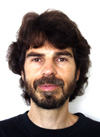 |
David Wolpert *
Homepage
Publications
dhw@ptolemy.arc.nasa.gov
|
|
David H. Wolpert earned his PhD. in physics at the Institute for
Theoretical Physics at Santa Barbara. He is currently a senior
computer scientist leading a research group at the NASA Ames Research
Center.
He has worked in physics, computational biology, machine learning,
statistics, optimization, theory of complexity measures, game theory
and economics. Among his current projects are:
- Investigation of the no-free-lunch and free-lunch theorems of
supervised learning and optimization, especially in the context of
coevolution
- Creation of the field of Collective Intelligence, i.e., of how to
design collectives of self-interested computational agents to achieve
a global goal
- Investigation of physical (as opposed to algorithmic) computation,
and in particular of the proof that the future cannot be
predicted even by an infinitely powerful computer
- Extension of the theorems of game theory to sub-rational games
- The investigation of self-dissimilarity as a complexity measure
|



















